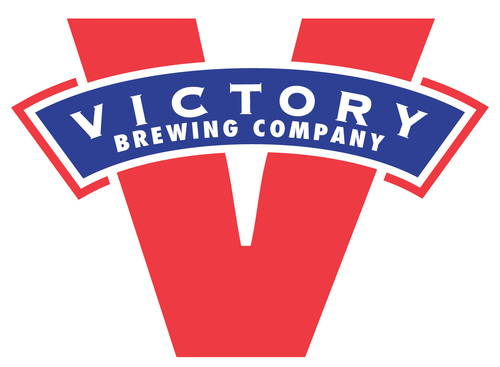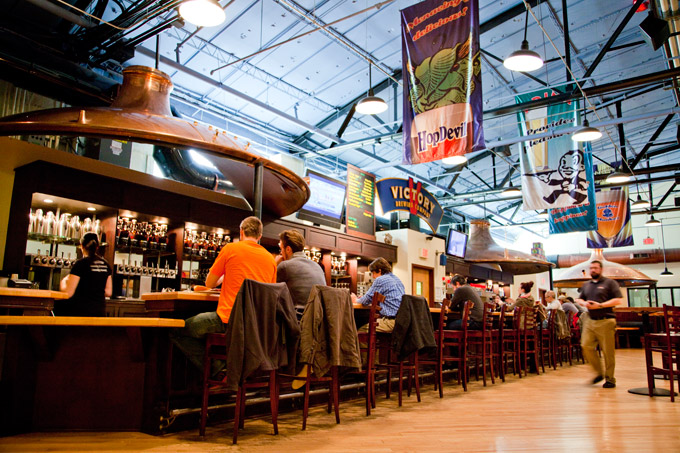Start 14-Day Trial Subscription
*No credit card required

Victory Brewery Tour
In Downingtown, Pa., however, there is no question that Pepperidge Farm bread came first – in the former bakery that now houses Victory Brewing Company, makers of the award-winning HopDevil I.P.A. and at least 30 other popular craft beers in their current portfolio.
 Renowned for non-conformist yet traditional brews, the owners, Ron Barchet and Bill Covaleski, have developed one of the most remarkable operations in the country. I first explored the facility in 2005 and was curious to return to see how the updated brewery and brew pub had fared through its ever-transforming evolutionary growth.
Renowned for non-conformist yet traditional brews, the owners, Ron Barchet and Bill Covaleski, have developed one of the most remarkable operations in the country. I first explored the facility in 2005 and was curious to return to see how the updated brewery and brew pub had fared through its ever-transforming evolutionary growth.
The Victory brewery is nestled inconspicuously on a side street in the suburbs west of Philadelphia. Four newly installed 400-barrel fermentation tanks pouch above the warehouse facility. Beyond a sprinkling of trees and an ocean of cars, two modern brewpub entrances suddenly pop into view.
Tours begin at the reception desk, where an engaging hostess with flamingo-pink hair invites visitors to briefly settle-in at the bar before their trek into the brewery. Styled after a German beer hall, the pub has ceilings as high as the energy level inside it. Seating for 300 is available at tables, booths and the bar itself, and aromas of fresh grain and smoky food permeate the nostrils. My eyes were drawn to the glowing copper-and-brass bar, where servers dispense 20 different beers from 60 taps, along with cask ales pumped from four beer engines. For prices between $3.50 and $7.50, day-trippers can “grab a pint to take on the tour.” The ambiance is further enhanced by three highly polished copper brew-kettle domes suspended over the bar area. Vintage Pennsylvania breweriana, encased in glass, draws attention to the opposite wall.
Rather than a robotic, self-guided tour with headphones, Victory creates a personal touch with a real human leading the pack. The day I visited, the restaurant manager, Brian Audet, wet his whistle with a Prima Pils as he gathered the tour-group together, which typically ranges in size from 12 to 40 visitors. Audet presented a 30- to 45-minute tour that is both informational and educational, with a smattering of fun.
A view inside the Victory Brewery
The brewery tour focuses on the finer points that make Victory beer distinctive – the traditional training both owners received in Germany, Barchet at the Weihenstephan center near Freising and Covaleski at the Doemens International Brewing Academy in Munich. Then the tours moves on to an overview of the 50-barrel Rolec system, installed in 2004, with a mini-lesson on the brewing process from wet-milling through fermentation. Last comes a spotlight on investments in centrifuge filtering, additional fermentation tanks, a state-of-the-art bottling line and the ingredients that make Victory beers great: Bavarian malts, fresh whole-flower hops and 30 yeast strains that impart uncommon character to each style. 
Visitors get a view of the shining stainless steel brewhouse (in action on Fridays), but are no longer privy to the cellar, where fermentation tanks of all shapes and sizes work their magic. Nor do tourists view the keg line, bottling line, whole hops storage cooler, or shipping docks.
On my tour, Audet kept his terminology simple, explaining that yeast “pees alcohol and farts carbon dioxide,” before adding, “We’re not hung up on tradition. This leaves us open for more styles, such as V-Twelve, our Belgian Quad, or Wild Devil – the same recipe as HopDevil but made with a different strain of yeast.”
Other highlights of the tour included an amusing tale of how the business was nearly named Independence Brewery before it was learned that that name had been snatched up a year earlier. Amidst financial woes, failed batches of beer and no name, Covaleski commented, “It’ll be a real victory if we ever make a go of this,” and Victory Brewing Company was born.
After the tour, the bar provides a perfect perch for watching the Alfred Gruber Austrian growler-filler in action. Under CO2 counter-pressure, this ingenious toy dispenses 20 different brands into two-liter German growlers with little loss of beer or CO2. The growlers light up, swirl and fill in a fascinating display. Even this Beer Fox walked out with a few.




Comments